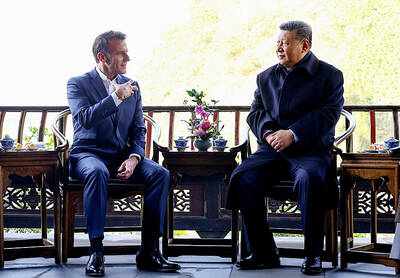Exiled Hong Kong dissidents said they fear UK government plans to restart some extraditions with the territory could put them in greater danger, adding that Hong Kong authorities would use any pretext to pursue them.
An amendment to UK extradition laws was passed on Tuesday. It came more than five years after the UK and several other countries suspended extradition treaties with Hong Kong in response to a government crackdown on the democracy movement and its imposition of a National Security Law.
The British Home Office said that the suspension of the treaty made all extraditions with Hong Kong impossible “even if there were strong operational grounds,” because it was still listed as a treaty state in the law.

Photo: AFP
The amendment has redesignated Hong Kong as a non-treaty state, bringing it into line with other countries for extraditions assessed on a case-by-case basis.
British Minister of State for Security Dan Jarvis has said that London would “never allow” extraditions for political purposes.
All requests are assessed by courts, and subjects have the right to appeal, Jarvis said.
“This government is uncompromising in its commitment to human rights, the rule of law and the protection of all individuals who reside in the United Kingdom, including the many Hong Kongers who have chosen to make their lives here,” a Home Office spokesperson said.
However, dissidents and advocates said that they fear Hong Kong authorities could exploit the ad hoc process to target political figures.
About 220,000 Hong Kongers with British national overseas status have fled to the UK, seeking residency. More have moved to the US, Australia, Canada and other countries, some as refugees.
Hong Kong has vowed to pursue overseas activists “to the end,” issuing arrest warrants and bounties for 38.
“Even if the current government does not intend to hand us over, we need binding commitments that this will never happen under any future government,” said Chloe Cheung (張晞晴), a public affairs and advocacy manager at the Committee for Freedom in Hong Kong Foundation’s London branch.
Carmen Lau (劉珈汶), a former Hong Kong politician now living in exile in London, said that British assurances that requests must be “nonpolitical” would be easily undermined.
“When you are the subject of an international arrest warrant and a bounty — a clear act of hostile state behavior on UK soil — a statement of commitment is simply not enough,” Lau said.
Chinese and Hong Kong authorities have a track record for laying nonpolitical charges against dissidents, sometimes to then switch out the allegation.
Supporters of Jimmy Lai (黎智英), a Hong Kong media tycoon and democracy advocate, have called his lease fraud convictions politically motivated and trumped up.
Lai is on trial for national security offenses.
“The idea, after watching the Jimmy Lai show trial, that we should be sending anybody back to China is an absurdity,” Conservative Member of Parliament Iain Duncan Smith said.
Luke de Pulford, cofounder of the Inter-Parliamentary Alliance on China, called for the British government to offer a “dedicated and concrete appeal mechanism to ensure nothing slips through the cracks.”
In 2021, the British government reportedly warned democracy advocates against traveling to countries with extraditions agreements with Hong Kong.
Feng Chongyi (馮崇義), a dissident academic now living in Australia, said before the amendment was passed that he would avoid the UK if it did.
Feng is wanted in Hong Kong for allegedly supporting a “subversive” organization.
“Making such amendments is a clear indication that the UK government is willing to compromise and cooperate with Beijing,” he said.
The amendment’s timing has also drawn suspicion, tabled amid efforts by the UK to negotiate a trade deal with China and a softer UK government approach toward Beijing.
In 2020, British Prime Minister Keir Starmer, then opposition leader, welcomed then-British prime minister Boris Johnson’s suspension of the extradition treaty, labeling it “a step in the right direction.”

PARLIAMENT CHAOS: Police forcibly removed Brazilian Deputy Glauber Braga after he called the legislation part of a ‘coup offensive’ and occupied the speaker’s chair Brazil’s lower house of Congress early yesterday approved a bill that could slash former Brazilian president Jair Bolsonaro’s prison sentence for plotting a coup, after efforts by a lawmaker to disrupt the proceedings sparked chaos in parliament. Bolsonaro has been serving a 27-year term since last month after his conviction for a scheme to stop Brazilian President Luiz Inacio Lula da Silva from taking office after the 2022 election. Lawmakers had been discussing a bill that would significantly reduce sentences for several crimes, including attempting a coup d’etat — opening up the prospect that Bolsonaro, 70, could have his sentence cut to

A plan by Switzerland’s right-wing People’s Party to cap the population at 10 million has the backing of almost half the country, according to a poll before an expected vote next year. The party, which has long campaigned against immigration, argues that too-fast population growth is overwhelming housing, transport and public services. The level of support comes despite the government urging voters to reject it, warning that strict curbs would damage the economy and prosperity, as Swiss companies depend on foreign workers. The poll by newspaper group Tamedia/20 Minuten and released yesterday showed that 48 percent of the population plan to vote

A powerful magnitude 7.6 earthquake shook Japan’s northeast region late on Monday, prompting tsunami warnings and orders for residents to evacuate. A tsunami as high as three metres (10 feet) could hit Japan’s northeastern coast after an earthquake with an estimated magnitude of 7.6 occurred offshore at 11:15 p.m. (1415 GMT), the Japan Meteorological Agency (JMA) said. Tsunami warnings were issued for the prefectures of Hokkaido, Aomori and Iwate, and a tsunami of 40cm had been observed at Aomori’s Mutsu Ogawara and Hokkaido’s Urakawa ports before midnight, JMA said. The epicentre of the quake was 80 km (50 miles) off the coast of

RELAXED: After talks on Ukraine and trade, the French president met with students while his wife visited pandas, after the pair parted ways with their Chinese counterparts French President Emmanuel Macron concluded his fourth state visit to China yesterday in Chengdu, striking a more relaxed note after tough discussions on Ukraine and trade with Chinese President Xi Jinping (習近平) a day earlier. Far from the imposing Great Hall of the People in Beijing where the two leaders held talks, Xi and China’s first lady, Peng Liyuan (彭麗媛), showed Macron and his wife Brigitte around the centuries-old Dujiangyan Dam, a World Heritage Site set against the mountainous landscape of Sichuan Province. Macron was told through an interpreter about the ancient irrigation system, which dates back to the third century